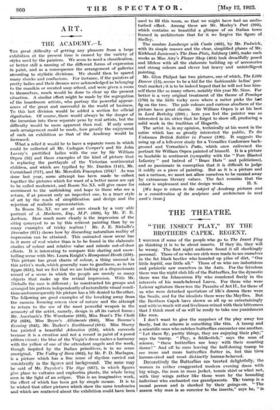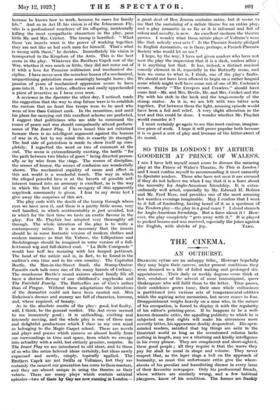THE THEATRE.
" THE INSECT PLAY," BY THE BROTHERS CAPEK. REGENT.
I WONDER if some of the people who go to The Insect Play go thinking it is to be about insects. If they'do, they will be wrong. The first night audience found it all shockingly personal. Those of us who are rich were made to see ourselves in the fat black beetles who hoarded up piles of dirt, "Our little kepitil, our little all." Those of us who are industrious and patriotic saw ourselves in the Ants. For the frivolous there was the night club life of the Butterflies, for the dynastic there was the Ichneumon Fly who murdered freely in the interests of his much-beloved Larva. For those who were Labour agitators there was the Parasite of Act II., for those of us who were detached spectators of life's drama there were the Snails, and for the idealists there were the Mayflies. But the Brothers Capek have shown us all up so entertainingly and with's+) much wit and liveliness mixed with their bitterness that I think most of us will be ready to take our punishment like men.
I don't want to give the surprises of the play away too freely, but its scheme is something like this. A tramp and a scientific man who catches,butterflies encounter one another. " Let them fly, pretty things, they are enjoying their play," says the tramp. " Play, a fiddlestick," says the man of science, "these butterflies are busy with their courting dance !" And off he runs leaving the half-dozing tramp to see more and more butterflies flutter in, but this time human-sized and most distinctly human-behaved.
Decoratively the Butterflies are treated delightfully, the women in rather exaggerated modern evening dress with big wings, the men in mess jacket, tennis shirt or what not, with tiny wings rather like those worn by the bounding ballerinas who enchanted our grandparents. Th) tramp is a moral person and is shocked. by. their • goings-on. " The reason why man is so superior to the insects," says he, " ia. because he knows how to work, because he cares for family life." And so in Act IL his vision is of the Ichneumon Fly, who is a professional murderer of his offspring, incidentally killing the most sympathetic characters in the play, poor little Mr. and Mrs. Cricket. The tramp is horrified. " What these 'ere insects want is the power of working together, they are not like us but each man for himself. That's what is wrong with them," he decides. Immediately his vision is transported to the Kingdom of the Ants. This is the best scene in the play. Whatever the Brothers Capek saw of the War, whether it was much or little, they did not come out of it with a love for Prussian militarism and mechanical dis- cipline. I have never seen the senseless horror of a mechanical, unquestioning patriotism more amazingly brought home ; the passion of years of mechanized oppression seems to have gone into it. It is as bitter, effective and easily apprehended a piece of invective as I have ever seen.
A reviewer in the Spectator the other day, I noticed, made the suggestion that the way to stop future wars is to establish the custom that no front line troops were to be used who were of less than Cabinet rank. In the meantime, and until his plans for carrying out this excellent scheme are perfected, I suggest that politicians who are able to command the issues of peace and war should compulsorily attend perform- ances of The insect Play. I have heard this act criticized because there is no intelligent, argument against the horrors of war in it, but to my mind this is exactly its strength. The bad side of patriotism is made to show itself up com- pletely. I regretted the word or two of comment at the end. The scene is extraordinarily exciting, the battle.' for the path between two blades of grass" being directed person- ally or by wire from the stage. The scenes of discipline, the scenes of horror, the scenes of confusion are wonderfully shown. The mechanical rapidity of cause and effect in this ant world is a wonderful touch. The way in which the alleged peaceful hive is at the breath of possible self- interest turned into an armoury is excellent, as is the way in which the first hint of the savagery of this apparently copybook community is given. I fear to say more lest I give away the surprises of this act.
The play ends with the death of the tramp through whose eyes we have seen it, and there is a pretty little scene, very well handled, in which sentimentality is just avoided, but in which for the first time we taste an exotic flavour in the play. For Mr. Playfair has adapted very thoroughly all through. The whole intention of the play is to write a contemporary satire. It is as necessary that the insects should be in some fantastic version of modern clothes and modern manners as that the Yahoos, the Lilliputians and Brobdingnags should be imagined in some version of a full- bottomed wig and full-skirted coat. " La Belle Cunegonde " would lose half her meaning with her hooped petticoat. The head of the satiric nail is, in fact, to be found in the auditor's own time and in his own country. The Capitalist Beetle, the Man-in-the-Street Snail, the Stump-Orator- Parasite each talk some one of the many brands of Cockney. The murderous Beetle's moral axioms about family life all have a distinct flavour of our childhood's copybooks and The Fairchild Family. The Butterflies are of Ciro's rather than of Prague. Without these adaptations the intentions of the dramatist could not have been carried out. Miss Zinkeisen's dresses and scenery are full of character, humour, and, where required, of beauty.
As to the absolute merits of the play : good, but faulty, will, I think, be the general verdict. The Ant scene seemed to me immensely good ; it is enthralling, exciting and intensely moving, and the whole play is one of those rare and delightful productions which I class in my own mind as belonging to the Magic Carpet school. There are novels and plays and poems which remove us almost bodily from our surroundings in time and space, from which we emerge into actuality with a mild, but entirely genuine, surprise. In The Insect Play we are introduced to old ideas, and to-those of us who like satire beloved ideas certainly, but ideas newly expressed and newly, crisply; topically applied. The Brothers Capek are not Swifts or Voltaires, but they are certainly the nearest our generation has come to these masters, and they are almost unique in using the theatre as their vehicle. There are many plays which contain satirical episodes—two of thein by Gay are now running in London— a great deal of Ben Jonson contains satire, but it seems to me that the sustaining of a satiric theme for an entire play, and a play romantic in so far as it is informal and full of colour and novelty, is new. An excellent medium the theatre proves. I wonder what those satiric plays of Voltaire's were like that nobody ever acts ? Is the Phoenix Society pledged to English dramatists, or is there, perhaps, a French Phoenix
Society who would let us see ? •
I hope, by the way, I have not given readers who have not seen the play the inipression that it is a dark, sunless affair ; it is anything but that. It has, indeed, a distinct musical comedy element in it, especially in the Butterfly scene, and here we come to what is, I think, one of the play's faults. We should not have been allowed to begin on a rather languid scene which might well have come out of one of Mr. Cochran's revues. Surely " The Creepers and Crawlers " should have come first—Mr. and Mrs. Beetle, Mr. and Mrs. Cricket and the Fly with his stab in the back and the tragi-comedy of the stump orator. As it is, we are left with two bitter acts together. Put between them the light, amusing episode would have been a foil and relief. A very slight alteration in the text and this could be done. I wonder whether Mr. Playfair would consider it ?
I must certainly go again to see this most curious, imagina- tive piece of work. I hope it will prove popular both because it is so good a sort of play and because of the bitter-sweet of its moral.



















































 Previous page
Previous page